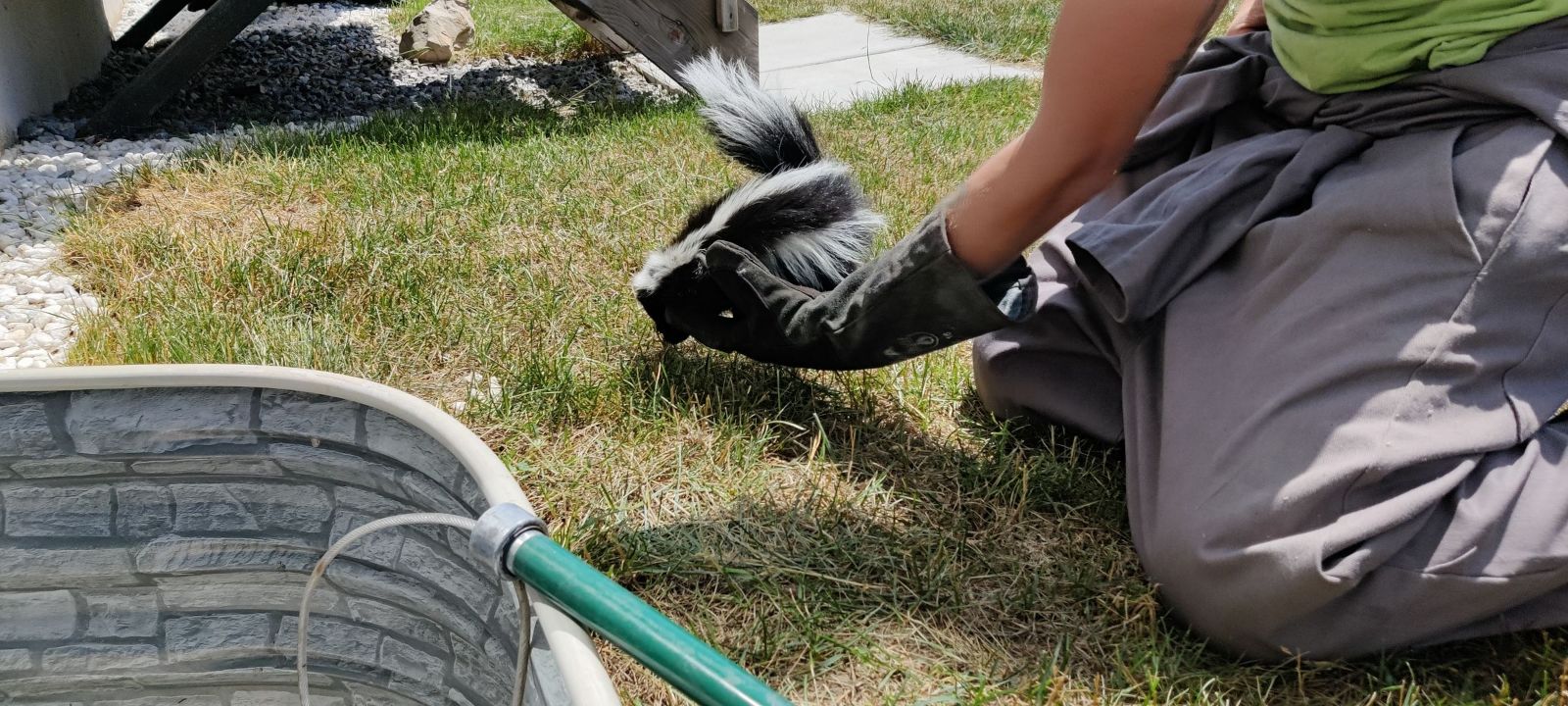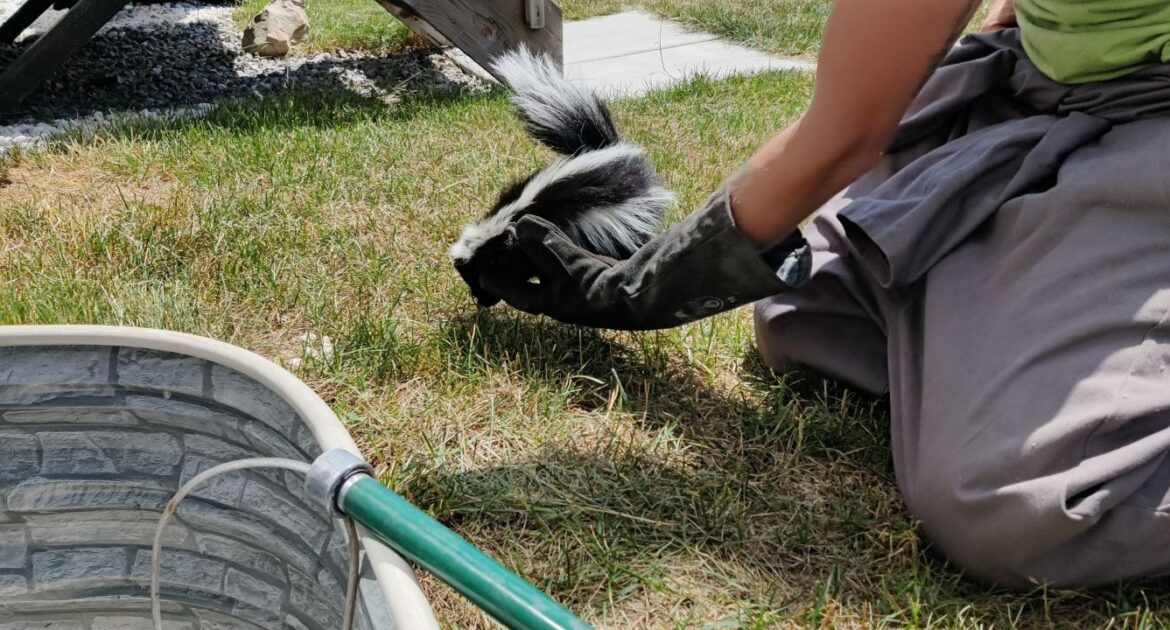Skunks may look cute, but they can cause serious damage to your lawn and garden. If you’ve spotted torn-up grass or half-eaten vegetables, skunks are likely to blame. This is a common problem in Montreal, where lush gardens and healthy soil attract skunks looking for food. From digging up lawns to raiding vegetable patches, they can quickly turn your outdoor space into a mess.
Skunks damage lawns and gardens as they search for food. They flip sod to find grubs, dig in flowerbeds for bugs, and eat ripened fruits and vegetables. Recognizing the signs of skunk activity early is key to protecting your garden before the damage gets worse.
That’s where Skedaddle Humane Wildlife Control in Montreal comes in. We offer safe, humane solutions to help homeowners reclaim their outdoor spaces.
This guide covers how skunks damage lawns, the signs of their presence, and practical ways to keep them out of your yard.
How Skunks Damage Lawns
Skunks are natural diggers. Their powerful front claws make it easy for them to tear apart your lawn in search of grubs and insects hiding just below the surface. Skunks damaging your lawn isn’t just about the visible holes they leave behind; it’s also about the larger pattern of destruction that can follow. These animals rarely stop at one patch and often move across yards overnight, leaving torn-up sod that’s hard to repair.
Some common ways skunks damage lawns include:
- Grub Hunting: Skunks dig small, cone-shaped holes to reach grubs and insects in the soil, using their strong claws to get below the surface. While each hole might not seem like much, the cumulative effect can be disastrous, leaving the grass looking patchy and uneven. Over time, these dug-up areas can make your yard more prone to erosion and harder to maintain.
- Rolling Back Sod: If skunks find a grub-rich area, they can tear up entire sections of turf, rolling it back as they dig, almost like peeling back carpet. This kind of skunk lawn destruction not only ruins the appearance of your grass but also makes it harder for rolled-up sod to re-root and grow properly. It can leave you with large bare patches that will take significant effort to repair.
- Hollow Spots: Repeated digging in certain areas can weaken your lawn structure, leaving it uneven and bumpy over time. These hollow spots can create trip hazards and make mowing or maintaining the lawn more difficult. If left unchecked, they can become larger and more problematic with each passing season.
For Montreal homeowners, the combination of mild weather and lush gardens makes lawns particularly vulnerable to skunks. If you spot these signs of damage, it’s time to take action.
What Skunks Do to Gardens
Your garden is another prime target for hungry skunks. They’re opportunistic feeders and will gladly feast on your plants, fruits, and vegetables. A skunk’s diet often overlaps with what you’ve carefully cultivated, making gardens their go-to source for easy meals.
Here’s how skunks can wreak havoc in your garden:
- Eating Fruits and Vegetables: Ripe tomatoes, strawberries, and zucchini are irresistible to skunks. They’ll nibble at anything within reach, leaving behind chewed-up plants and half-eaten produce. Over time, skunks can wipe out large portions of your garden, ruining the effort you’ve put into growing fresh and healthy food. Their feeding habits can also spread to other plants, making it difficult to protect the rest of your harvest.
- Digging for Insects: Just like with lawns, skunks will dig in your garden beds to uncover bugs, disturb plant roots and leave soil in disarray. These small holes may seem harmless at first, but the damage can interfere with your plants’ ability to grow. If skunks target the same areas repeatedly, their digging can end up destroying entire sections of your garden.
- Eating Seeds: Skunks will also sniff out seeds you’ve sown, often undoing all your hard work before plants even sprout. They may dig through freshly planted rows or scatter soil in their search, leaving nothing but a mess behind. This can force you to replant altogether, delaying your garden’s growth by weeks.
- Crushing Plants: While rummaging through your garden, skunks can trample delicate flowers and vegetables, causing further destruction. Their movements can snap stems, crush blooms, and damage leaves, leaving plants vulnerable to disease. This kind of damage not only impacts the look of your garden but also reduces the chances of your plants thriving.
This kind of skunk lawn destruction can turn a thriving garden into a patchy mess in no time. Protecting your garden from skunks means acting quickly before the damage spreads.
Signs You Have a Skunk Problem
It’s not always obvious that skunks are the ones causing trouble in your yard. However, knowing what to look for can help you confirm their presence and take control of the situation.
Here are the top signs of skunks damaging your lawn or garden:
- Small, cone-shaped holes in the ground where they’ve dug for grubs.
- Rolled-up sections of turf, especially in areas rich in insects.
- Bite marks on fruits, vegetables, or plants.
- A strong, musty smell that lingers in your yard, even if no spray is present.
- Skunk droppings are found near their trails or feeding sites.
If you’ve noticed any of these signs, it’s time to act! Skunks aren’t just messy. They can also stick around if they find your yard offers a reliable source of food.
How to Protect Your Garden from Skunks
The best defence against skunks damaging lawns or gardens is prevention. Keeping them out will save your yard from unnecessary destruction and minimize the frustration of dealing with recurring problems.
Here are some practical steps to protect your garden from skunks and prevent skunk lawn destruction.
- Secure Garbage Bins: Skunks are drawn to the smell of food scraps, so ensure bins are tightly closed and inaccessible.
- Eliminate Grubs: Treat your lawn to reduce grub populations. Skunks won’t bother digging in areas where food is scarce.
- Fence Your Garden: A low fence that extends underground can prevent skunks from digging into your vegetable beds.
- Clear Clutter: Remove woodpiles, brush, or debris where skunks may hide.
- Use Deterrents: Motion-activated sprinklers or lights can scare skunks away before they start digging.
These steps may help reduce the chances of damage, but skunks are persistent creatures. Once they’ve made themselves comfortable in your yard, it’s tough to get rid of them on your own. When the problem becomes too much to handle, it’s time to call in professionals like us, Skedaddle Humane Wildlife Control, to fix the issue safely and effectively.
Why Call Us at Skedaddle Humane Wildlife Control in Montreal?
When it comes to removing skunks, it’s always best to trust experienced professionals. We at Skedaddle Humane Wildlife Control in Montreal have mastered safe and humane ways to handle wildlife intrusions. Our one-way door method is a game-changer. This approach allows skunks to exit your property while preventing them from returning, ensuring they don’t come back to disturb your lawn or garden.
Trying to deal with skunks on your own can be risky for both you and the animal. Whether it’s the risk of their spray, potential bites, or increased damage when they feel threatened, it’s better not to take chances. Our expert team ensures your garden is protected, and we do so without causing harm to the skunks themselves.
Take Back Your Lawn and Garden Today
If skunks are damaging your lawn or garden, don’t wait for the problem to worsen. Protect your yard the right way by trusting our team at Skedaddle Humane Wildlife Control in Montreal. With our proven methods and dedication to humane solutions, we’ll help restore your yard to its best condition.
Request an estimate today to learn more about how we can help you protect your garden from skunks. Don’t spend another day stressing over skunk lawn destruction. Reach out to us now and reclaim your outdoor space!




